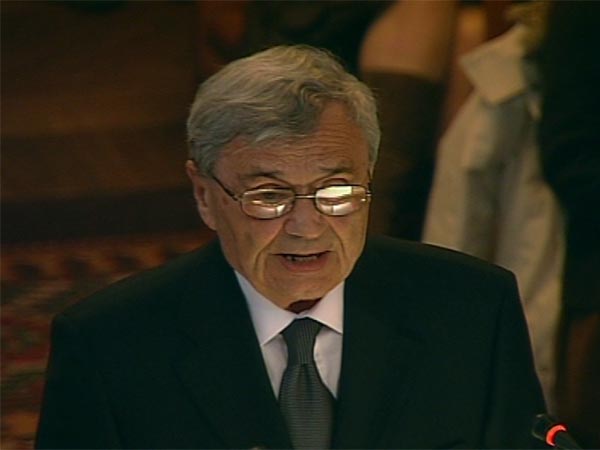Home
OFFICERS WERE NOT PAID TO FIGHT WAR
Belgrade’s representatives use the fact that Belgrade continued to pay Republika Srpska Army officers seven years after the peace accords as evidence that even before Dayton they had not been paid to fight the war
 Radoslav Stojanovic, chief legal representative of Serbia and Monte Negro at the ICJ
Radoslav Stojanovic, chief legal representative of Serbia and Monte Negro at the ICJ Since the former FRY – now SaM – joined the UN in late 2001, signing the Genocide Convention, the International Court of Justice lacks jurisdiction to adjudicate in the BH vs. SaM case. The application was filed in March 1993 by Sarajevo, accusing Belgrade of genocide in BH. If the ICJ reaffirms its previous decisions confirming its jurisdiction, Sarajevo’s application to find SaM responsible for the violation of the Convention and to compel it to pay reparations must be dismissed, because the crimes committed in BH cannot be qualified as genocide and cannot be blamed on Belgrade.
This would be the condensed version of the presentations made by SaM representatives this morning as the second – and last – round of arguments before the ICJ began. Radoslav Stojanovic, SaM’s agent, repeated the well-known arguments Belgrade uses to challenge the jurisdiction of the International Court of Justice. They have all been rejected by the judges of the highest world court in 2003 in the BH vs. SaM case, only to accept them a year later in the SaM vs. NATO case. It seems that in the next five says, the issue of jurisdiction will be the focus of the second round of Belgrade’s arguments.
Sarajevo’s claim that between 1992 and 1995, genocide was committed in BH was contested by Stojanovic, with counter-claims of “inflated victim figures” and the “lack of specific intent” to destroy an ethnic or religious group in whole or in part as such. While he admitted that “from a theoretical viewpoint, the number of victims is not relevant” for the qualification of a crime as genocide, Stojanovic referred to the ICTY jurisprudence. According to him, this jurisprudence introduced a “quantitative element”. Thus, “a substantial number of victims” is essential for genocide. The Bosnian side, Stojanovic went on to say, does not have evidence of Belgrade’s “genocidal intent” and it therefore tried to prove it “indirectly”, claiming that intent could be inferred from the “pattern” of crimes and the “political goal” Belgrade and Pale aspired to. The political goal of the creation of a state for all the Serbs, according to Stojanovic, “did not include a plan to destroy other peoples”.
[IMAGE]1951[/IMAGE]After Stojanovic’s introduction, British lawyer Ian Brownlie analyzed the evidence the Bosnian side presented in an attempt to lay the blame for the crimes committed by Bosnian Serbs on Belgrade. Brownlie dealt in particular detail with the financial analysis done by Norwegian expert Morten Torkildsen used by the BH side to prove that the FRY, Republika Srpska and the Republic of Serbian Krajina made up “a single monetary and economic entity”. Brownlie denied that the central banks in RS and RSK were under the control of the Yugoslav National Bank, and that Belgrade financed the budget deficits in Pale and Krajina. Belgrade merely provided loans to Pale and Knin to cover the budget deficit, Brownlie claims, comparing that to loans the International Monetary Fund gives to states in financial difficulties. The fact that Belgrade continued to pay the salaries of a number of Republika Srpska Army officers even after the Dayton accords, well into 2002, goes to show, Brownlie says, that they had not been paid to fight the war even before the peace accords.
Brownlie went on to deny any evidentiary value to “statements of fact” signed by some of the ICTY indictees as part of their plea agreements. Those statements were quoted often by BH representatives. He mentioned in particular the statements made by Biljana Plavsic and Miroslav Deronjic, where they speak about the ties between the Bosnian Serb leadership and Slobodan Milosevic and the logistic support received from Belgrade. The statements were drawn up by the ICTY Office of the Prosecutor, and the accused, Brownlie claims, signed them “under duress”, faced with the threat of a life sentence. According to him, then, they do not have any evidentiary value.
